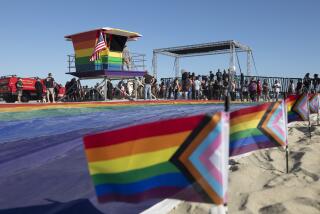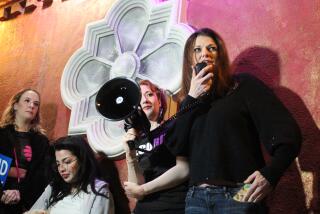Sex Bias Case : He Bounces Back With a Lawsuit
- Share via
The first to go was “ladies’ night.”
An Orange County man challenged the traditional promotions held by bars at which women were admitted free of charge. He said the practice amounted to sex discrimination. Last year, the California Supreme Court agreed.
Next, price breaks for females at car washes were struck down as discriminatory.
Now, Christopher J. Nicoll insists that dress codes in nightclubs must be sex-neutral.
Nicoll, a paralegal, has sued P.J. Bentley’s in the Holiday Inn in Buena Park, contending that if women can wear shorts, so can men.
Seeks $1 Million
Nicoll has also asked for more than $1 million in damages, claiming he was bounced out of the club and arrested when he protested the dress code last summer.
“They’re nothing disgraceful, just a normal pair of shorts,” said Marc J. Feinstein, lawyer for Nicoll.
Both men work for the Santa Ana law firm of Brennan & Hollins.
“They’re pretty much like Bermuda shorts, slightly above the knee,” Feinstein said. “Surprisingly, the male employees--the waiters and bartenders--wore shorts. It’s the uniform.”
Nicoll claims that just before midnight on July 25, 1985, he and three companions tried to enter the nightclub, but he was told he could not.
No Short Pants
“More specifically,” according to the lawsuit, “plaintiff was informed that men were not allowed to patronize Bentley’s while wearing short pants.”
When Nicoll protested that women in shorts were allowed in, three employees began to “physically and verbally intimidate and threaten” him, according to the lawsuit.
Nicoll alleged that when he tried to wait for his three friends in the hotel lobby, security guards made a citizen’s arrest and then turned him over to police. Feinstein said trespass charges eventually were dropped.
A spokesman for the hotel declined comment.
“My client is asking for emotional distress from the arrest and being subjected to all that accompanies an arrest,” Feinstein said. “He was booked, fingerprinted and photographed and had to spend several hours in jail.”
‘An Easy Win’
Ron Talmo, the law professor at Western State University College of Law who won the ladies’ night case last year, said Nicoll can anticipate “an easy win.”
“Discrimination on the basis of shorts or no shorts is fine, but you can’t make a distinction on the basis of sex or you’re violating state law,” Talmo said.
The high court was unanimous last year, he said.
“The court said a bar or tavern can have special promotions--such as everyone wearing a green T-shirt gets in free--but you can’t discriminate on the basis of sex,” the professor said.
Last fall, Talmo said he was not aware of any other state that had come to a similar conclusion. Since then, only one state court has become involved in similar issues, Talmo said.
In Maryland, a court first ruled that a ladies’ night at a bar violated state law, and then in a case involving the same tavern, decided that a promotion allowing free entry to anyone wearing a skirt also was discriminatory, Talmo said.
Equal Treatment
Feinstein said he thinks the law is clearer in his case.
“To me, our case is even stronger. The state Civil Rights Act clearly applies to businesses and talks about equal treatment of patrons in all aspects of the business,” he said.
More to Read
Sign up for Essential California
The most important California stories and recommendations in your inbox every morning.
You may occasionally receive promotional content from the Los Angeles Times.













